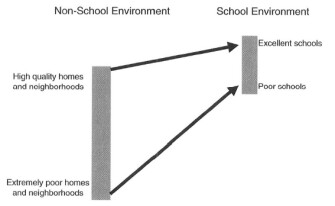
Sexy sound bite solutions dominate education policy airtime - paying kids for test scores, paying teachers for test scores, and eliminating teacher certification are some of the latest examples.
My final wish for the next four years is much more banal. Kids spent the overwhelming majority of their 0-18 years outside of school - the average American has spent 87% of his or her waking hours outside of school by age 18. If we want to reduce inequality, we need to start thinking seriously about how kids are spending the majority of their time, and support interventions like pre-school and an extended school day and year.
Even if all kids attended schools of identical quality, we would still see inequality in educational outcomes by socioeconomic status because of the 87% conundrum. Home learning environments, it turns out, are much more unequal than school environments. Below, this figure in a terrific paper by Doug Downey and colleagues makes this very clear. To be sure, schools offer unequal learning opportunities, but there is even more inequality in learning opportunities between families.

In other words, the difference between the best and worst schools is smaller than the difference between the most and least enriched home learning environments. As Downey put it, “As a result, a disadvantaged child attending a low-quality school can still enjoy a larger ‘school boost’ than an advantaged child attending a high quality school. In this way schools can favor advantaged students, but still serve as equalizers.”
This is not to say that we shouldn’t also focus on that 13%, but that increasing the amount of time that poor kids spend in school is a promising strategy for reducing inequality. While it is an expensive intervention, keeping poor kids in school longer - both for preschool and during the school year and summer - is a policy option that deserves more attention.
(For those who are interested in the research here, Karl Alexander found that two-thirds of the reading achievement gap between poor and rich 9th graders in Baltimore is explained by how much they learned during their elementary school summers: Karl Alexander‘s recent work - written up here in Ed Week - or Doug Downey and colleagues paper using data from the Early Childhood Longitudinal Study. )

